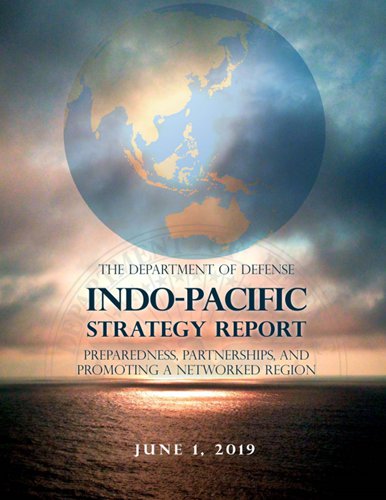HOME >> OPINION
China seeks pragmatic cooperation despite US Indo-Pacific Strategy
Source:Global Times Published: 2020/1/1 19:08:42

The photo is the cover of the Indo-Pacific Strategy Report published on the official website of the US Department of Defense.
The divergences between China and the US have been going on for some time with the West Pacific region in the throes of the tension between the two major powers. As China-US competition intensifies, the US is becoming increasingly anxious about its global hegemony.
The US has labeled China as a revisionist power and a strategic competitor. Some American people have a deep belief in the Thucydides' Trap, which leads to increasing US strategic suspicion toward China.
In addition, the US believes that China's theory of peaceful development is not logically valid.
Many countries have their own versions of the so-called Indo-Pacific Strategy, such as Australia, Japan, India and the US. They all more or less aim at countering or coordinating against the China-proposed Belt and Road Initiative (BRI), which reflects their anxiety over China's rise.
Of all the versions, the US Indo-Pacific Strategy is the most systematic and the most offensive one.
India's recognition of the US Indo-Pacific Strategy is largely due to its concerns about China. India has many doubts about the BRI and wants to counter China's rapidly increasing influence in the Indo-Pacific region.
Besides, India does not have enough strength to compete with China alone, and thus wants to cater to the US strategy of containing China.
However, there are still many restraints on India. For example, there are disputes between New Delhi and Washington. India also lacks adequate national power and thus does not want to irritate China beyond a point.
Washington is very concerned about its exclusion from the process of regional integration in the Asia-Pacific region through the Regional Comprehensive Economic Partnership. The US wants to prevent its alliance system from collapsing. The US Indo-Pacific Strategy pursues a so-called free and open Indo-Pacific, aiming at maintaining previous regional balance. In other words, Washington pursues an Indo-Pacific region that is based on rules dominated by the US.
The US has strengthened and modernized its military presence in the Indo-Pacific region and consolidated military cooperation with its allies and partners. Economically, the US has unveiled the so-called Blue Dot Network which aims at promoting "high-quality, trusted standards for global infrastructure development." Ideologically, the US has been tarnishing the BRI and has been funding so-called human rights and democratic activities to challenge the political system of China.
The Trump administration has turned the Indo-Pacific Strategy from a concept to one that can be practiced, and the US has significantly intensified its strategic containment of China. However, Washington still faces many hurdles in expanding its Indo-Pacific Strategy.
First, during the implementation of the Indo-Pacific Strategy, it is hard for the Trump administration to get rid of the influence from its "America First" policy. Second, the strategy focuses too much on containing China, and this may prevent other regional countries from proactively participating in it. Third, the Indo-Pacific Strategy has many economic initiatives but the US government's relevant investment has been limited, so it is not enough to persuade regional private companies to follow up.
To break the US Indo-Pacific Strategy's containment of China, the latter needs to maintain strategic focus and do its own things well. China should promote pragmatic cooperation with Japan, India and ASEAN members. As Beijing takes into account major countries' strategic concerns, it should also care for the appeals of small neighboring countries.
The game between China and the US is a competition between different systems. China-US decoupling will be the worst-case scenario, and we should prevent it from happening. Peace dividend is where Chinese people's biggest interest lies.
The article was compiled based on an address by Hu Shisheng, director of the Institute of South and Southeast Asian and Oceania Studies at the China Institutes of Contemporary International Relations, at Peking University. opinion@globaltimes.com.cn
Posted in: ASIAN REVIEW